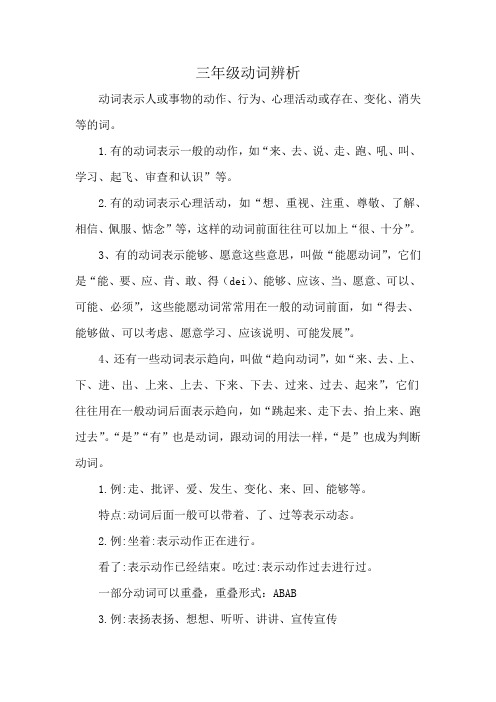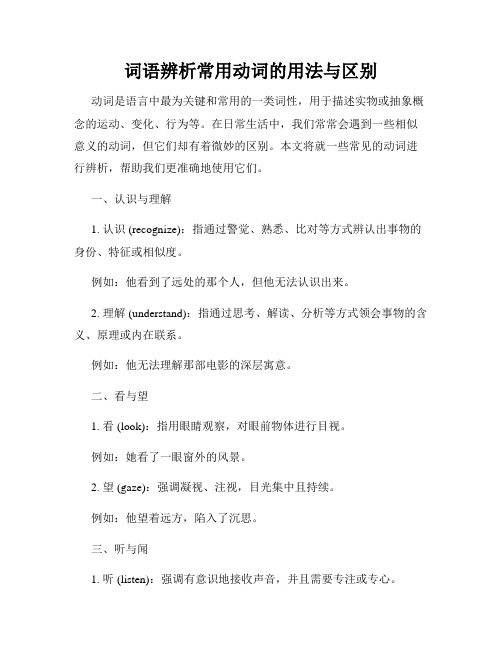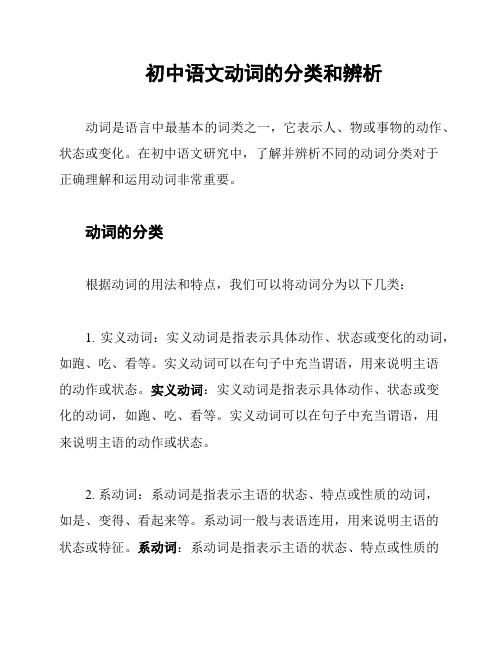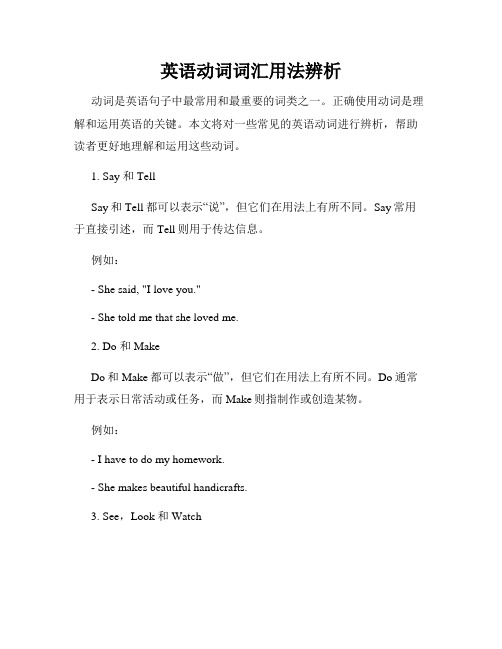动词辨析
三年级动词辨析

三年级动词辨析
动词表示人或事物的动作、行为、心理活动或存在、变化、消失等的词。
1.有的动词表示一般的动作,如“来、去、说、走、跑、吼、叫、学习、起飞、审查和认识”等。
2.有的动词表示心理活动,如“想、重视、注重、尊敬、了解、相信、佩服、惦念”等,这样的动词前面往往可以加上“很、十分”。
3、有的动词表示能够、愿意这些意思,叫做“能愿动词”,它们是“能、要、应、肯、敢、得(dei)、能够、应该、当、愿意、可以、可能、必须”,这些能愿动词常常用在一般的动词前面,如“得去、能够做、可以考虑、愿意学习、应该说明、可能发展”。
4、还有一些动词表示趋向,叫做“趋向动词”,如“来、去、上、下、进、出、上来、上去、下来、下去、过来、过去、起来”,它们往往用在一般动词后面表示趋向,如“跳起来、走下去、抬上来、跑过去”。
“是”“有”也是动词,跟动词的用法一样,“是”也成为判断动词。
1.例:走、批评、爱、发生、变化、来、回、能够等。
特点:动词后面一般可以带着、了、过等表示动态。
2.例:坐着:表示动作正在进行。
看了:表示动作已经结束。
吃过:表示动作过去进行过。
一部分动词可以重叠,重叠形式:ABAB
3.例:表扬表扬、想想、听听、讲讲、宣传宣传。
动词易混辨析

动词易混辨析动词作为语言中最基础也最常用的词类之一,在表达过程中经常会混淆使用。
本文将就一些常见的动词易混辨析问题进行讨论,希望能够帮助读者更好地理解和运用这些词汇。
一、告诉与说告诉与说都表示将信息传递给他人,但使用的语法结构有所不同。
告诉通常后面跟宾语,而说则常常后面跟表示说话内容的宾语从句。
1. 告诉告诉用于将信息传递给他人,表示明确的指示或者陈述。
例如:- 我告诉他我要去旅行。
- 她告诉我今天下雨了。
2. 说说用于表达讲话的内容,常常后面跟表示说话内容的宾语从句。
例如:- 他对我说他喜欢我的新发型。
- 她说她会来参加聚会。
二、看与看见看和看见都表达了“用眼睛观察”的意思,但它们的用法和含义略微有所区别。
1. 看看侧重于主动地用眼睛观察某物,强调的是动作本身。
例如:- 我在公园里看到了一只小狗。
- 他正在看电视节目。
2. 看见看见则更强调对眼前事物的感知,强调的是看到某物的结果和效果。
例如:- 我终于看见了望远镜里的行星。
- 她看见他吃完晚饭离开了。
三、知道与了解知道和了解都表示对某事或某物有所了解,但它们在程度和语义上有一定的区别。
1. 知道知道指对某事或某物有所认识,对信息的了解程度较浅。
例如:- 我知道他是个著名的作家。
- 她知道今天是她的生日。
2. 了解了解则表示对某事或某物有更深入的了解和认识。
它的程度和语义常常比知道强。
例如:- 我了解他的生平经历。
- 他全面了解该公司的运营情况。
四、决定与决心决定和决心都涉及到做决定或者下决心的意思,但两者的用法和语义有所差异。
1. 决定决定常常用于表示做出某种决策或抉择。
例如:- 我决定明天要去旅行。
- 他决定换个新工作。
2. 决心决心更强调的是一个坚定的意志和决策。
例如:- 她决心学好英语。
- 他下定决心要减肥。
五、希望与期望希望和期望都表示对未来的一种期待,但它们的用法和语义略有区别。
1. 希望希望常常用于对个人的期待和愿望。
例如:- 我希望明天天晴。
常用动词辨析

常用动词辨析在英语学习中,必须掌握同义词、易混词、相似词及相近短语之间得区别,搞清英语与汉语之间得差别.词语辨析,尤其就是动词词语辨析正成为“专转本”考试得热点。
1.accept,receive, admit,take接受、接纳ﻫaccept强调主动地或自愿地接受,或者说,经过考虑后同意接受。
ﻫreceive着重仅仅接到或收到得客观事实,还可以表示“接见、接待”admit作“接受”讲时,强调准许或批准。
take与receive同意,就是receive得日常用法,侧重不带主观意愿地收下或接受。
2.absorb,suck,digest,incorporate吸收ﻫabsorb普通用词,词义广泛,既可指吸收光、热、液体等具体东西,又可指吸收知识等抽象概念得东西。
beabsorbed insuck作“吸收”解时,可与absorb换用,但还可有“吮吸”之意。
ﻫd igest侧重在消化道内改变食物得化学结构后被人体吸收。
incorporate指一物或多物与它物相融合,形成一整体。
3.accuse, charge指控、谴责accuse普通用词,正式或非正式场合,私人或法律上均可用。
被指控得情节可轻可重。
常与of连用.accuse sb、of (doing)sth、;beaccused ofcharge常与accuse换用,但charge多指较严重得错误或罪行,而且往往向法庭提出正式起诉。
charge sb、with (doing)sth、;be chargedwith4、acquire, obtain, gain,get,win,earn, secure获得、取得、得到acquire强调通过不断得、持续得努力而获得某物,也指日积月累地渐渐地获得。
书面语用词.ﻫobtain较正式用词,着重通过巨大努力、要求而得到所需或盼望已久得东西。
ﻫgain侧重指经过努力或有意识行动而取得某种成就或获得某种利益或好处。
get普通用词,使用广泛,可指以任何方式得到某物,也不一定要经过努力。
词语辨析常用动词的用法与区别

词语辨析常用动词的用法与区别动词是语言中最为关键和常用的一类词性,用于描述实物或抽象概念的运动、变化、行为等。
在日常生活中,我们常常会遇到一些相似意义的动词,但它们却有着微妙的区别。
本文将就一些常见的动词进行辨析,帮助我们更准确地使用它们。
一、认识与理解1. 认识 (recognize):指通过警觉、熟悉、比对等方式辨认出事物的身份、特征或相似度。
例如:他看到了远处的那个人,但他无法认识出来。
2. 理解 (understand):指通过思考、解读、分析等方式领会事物的含义、原理或内在联系。
例如:他无法理解那部电影的深层寓意。
二、看与望1. 看 (look):指用眼睛观察,对眼前物体进行目视。
例如:她看了一眼窗外的风景。
2. 望 (gaze):强调凝视、注视,目光集中且持续。
例如:他望着远方,陷入了沉思。
三、听与闻1. 听 (listen):强调有意识地接收声音,并且需要专注或专心。
例如:我听到了远处传来的音乐声。
2. 闻 (smell):指用鼻子感知气味,通常是无意识或自然反应。
例如:我闻到了花园中花朵的香气。
四、做与创造1. 做 (do):指进行某种行动或活动。
例如:今天,我要做一些家务。
2. 创造 (create):强调通过思维、创造力或想象力产生新的事物或概念。
例如:他利用木头和石头创造了一座美丽的雕塑。
五、说与讲1. 说 (say):泛指通过口头方式表达意思、讲话。
例如:他对我说了一些慰问的话。
2. 讲(speak/talk):强调通过口头方式交流思想、创造性地陈述观点。
例如:他在演讲中讲述了自己的创业经历。
六、走与行1. 走 (walk):指用脚步离开、前进,一般速度较慢。
例如:她每天早上都走到公司。
2. 行 (go):强调朝某个目的地出发或进行移动。
例如:他要去超市行一趟。
七、买与购买1. 买 (buy):指交换金钱以获取商品、服务等。
例如:我买了一本新书。
2. 购买 (purchase):强调通过购物行为获得商品,语气正式。
动词词义辨析及练习

Ø 知识点动词词义的辨析动词辨义主要指:1、形状相同的动词之间辨义。
如:lie, lay; hanged, hung; rise, raise; sit, seat 等。
2、意义相近的动词之间辨义。
如:borrow, lend; speak, say, talk; hope, wish 等。
3、动词与其它词形相近、意义相似的词的辨义。
如:advise, advice; cost, worth; pass, past 等。
4、意义不同,但容易混淆的动词的辨义。
如:explain, say; discover, invent, uncover; find, find out 等。
5、某些常用动词的习惯用法的辨义。
如:ask, give, call, make, find, get, keep, want, see, hear 等。
6、某些常用动词短语的辨义。
如:give in, give up, turn on, turn off, turn down, turn up 等。
等。
(一) 易混动词1.中 文 原 形 过 去 式 过去分词过去分词 现在分词现在分词 说 明放 lay laid laid laying 及物动词及物动词躺 lie lay lain lying 不及物动词不及物动词说谎说谎 lie lied lied lying 不及物动词不及物动词2. Rise 和raise :rise 是不及物动词,其过去式是rose ,过去分词是risen ,而raise 是及物动词,是规则动词。
物动词,是规则动词。
3.hear 与listen to :hear 侧重点是听到,听见什么,而listen to 是侧重于听的倾向,但hear 用于无意中的听见,而listen to 却用于集中注意力的听。
却用于集中注意力的听。
4.see, watch 和look :see 用作看电影,剧目;watch 则用作看电视比赛,而watch 还有在旁观看之意。
初中语文动词的分类和辨析

初中语文动词的分类和辨析动词是语言中最基本的词类之一,它表示人、物或事物的动作、状态或变化。
在初中语文研究中,了解并辨析不同的动词分类对于正确理解和运用动词非常重要。
动词的分类根据动词的用法和特点,我们可以将动词分为以下几类:1. 实义动词:实义动词是指表示具体动作、状态或变化的动词,如跑、吃、看等。
实义动词可以在句子中充当谓语,用来说明主语的动作或状态。
实义动词:实义动词是指表示具体动作、状态或变化的动词,如跑、吃、看等。
实义动词可以在句子中充当谓语,用来说明主语的动作或状态。
2. 系动词:系动词是指表示主语的状态、特点或性质的动词,如是、变得、看起来等。
系动词一般与表语连用,用来说明主语的状态或特征。
系动词:系动词是指表示主语的状态、特点或性质的动词,如是、变得、看起来等。
系动词一般与表语连用,用来说明主语的状态或特征。
3. 情态动词:情态动词是指表示说话人的语气、态度或看法的动词,如可以、能够、应该等。
情态动词通常与不带to的动词原形连用,用来表示可能性、能力、意愿等。
情态动词:情态动词是指表示说话人的语气、态度或看法的动词,如可以、能够、应该等。
情态动词通常与不带to的动词原形连用,用来表示可能性、能力、意愿等。
4. 助动词:助动词是用来帮助构成谓语的动词,如be动词的各种形式、have、do等。
助动词通常与主要动词一起构成谓语,用来表示时态、语态、疑问句和否定句等。
助动词:助动词是用来帮助构成谓语的动词,如be动词的各种形式、have、do等。
助动词通常与主要动词一起构成谓语,用来表示时态、语态、疑问句和否定句等。
动词的辨析在使用动词的过程中,我们还需要注意不同动词的用法和含义的区别,以避免使用错误或不准确的词语。
1. 看、望、注视:这几个动词都表示视线的方向和程度,但用法略有不同。
看通常指用眼睛观察,注重一时的视觉行为;望指远离看,视线向远处延伸,注重远处的目标;注视指专心地看,注重对目标的注意和观察。
英语动词词汇用法辨析

英语动词词汇用法辨析动词是英语句子中最常用和最重要的词类之一。
正确使用动词是理解和运用英语的关键。
本文将对一些常见的英语动词进行辨析,帮助读者更好地理解和运用这些动词。
1. Say 和 TellSay和Tell都可以表示“说”,但它们在用法上有所不同。
Say常用于直接引述,而Tell则用于传达信息。
例如:- She said, "I love you."- She told me that she loved me.2. Do 和 MakeDo和Make都可以表示“做”,但它们在用法上有所不同。
Do通常用于表示日常活动或任务,而Make则指制作或创造某物。
例如:- I have to do my homework.- She makes beautiful handicrafts.3. See,Look和WatchSee,Look和Watch都可以表示“看”,但它们在用法上有所不同。
See强调“看到”,Look着重于目光集中在某处,Watch则表示有意地观察。
例如:- I saw a movie last night.- Look at that beautiful sunset!- Let's watch a soccer game tonight.4. Go,Come和GetGo,Come和Get都可以表示“去”,但它们在用法上有所不同。
Go 指从说话者所在的地方离开,Come指朝说话者所在的地方靠近,Get 则强调到达某个地点。
例如:- I will go to the park tomorrow.- Please come to my house for dinner.- Let's get to the airport early.5. Take,Bring和FetchTake,Bring和Fetch都可以表示“拿”,但它们在用法上有所不同。
Take表示从说话者所在的地方带走,Bring表示朝说话者所在的地方拿来,Fetch则表示去某处拿来。
动词辨析

1. attitude, 态度;看法;姿势latitude,纬度;(言行的)自由;latitudes纬度地区;{longitude经度} altitude高度,海拔gratitude 感激之情;谢意2. contribute 捐助;促成;投稿attribute (n.性质,属性)(v.把sth归因于)distribute分发,分配;使分布,使散开;把(货物)送到3. describe描述;叙述;描绘prescribe开药,开处方;指定,规定(某事)subscribe赞同(信仰或观点);订阅(杂志等);捐助,定期捐款substitute(n.代替物,代替者)(v.代替,取代)no substitute 无法替代4. difference差异,差别Indifference不关心,不在乎5. simultaneous同时发生的(n. simultaneity)Spontaneous自然发生的;自动的(n. spontaneity)6.senior (n.)年长者;前辈;上级(adj.)较年长的;地位较高的;高级junior (n.)低级职位的人(adj.)职、地位低的;较年幼的superior(n.)上级,上司(adj)高级的;上等的;有优越感的;高傲的Superior(n.)苏比利尔【美国城市】inferior(n)下级;地位低的人(adj.)差的;次的;不重要的prior(n.)小修道院院长,女院长:prioress(adj.)事先的;首要的;优先的;已存在的;prior to 在…以前priority优先考虑的事情have priority ,be given priority有优先权get your priorities right先处理最重要的事情minor (n.)未成年人(adj.)较轻微的;较小的;较次要的major (n.) 成年人(adj.)主要的;较重要的Major(n.)少校Mayor 市长mayoress 女市长或市长夫人7. presume猜想,假定,推测presume to do sth 擅自做某事resume(中断后)重新开始;重返,回到(某处)consume吃,喝;消耗,消费;毁坏,烧毁;为某种思想或感情而不断受折磨assume假定,假设;行使权力;假装,装出8. considerate想得周到的,体贴的Considerable相当大的,可观的(指数量)9. favor(n.)好感,好意,恩惠,帮忙,关切,喜爱,偏爱(v.)支持,赞成,照顾,喜欢,赐予favorite(n.)喜爱之物,特别喜欢的人,亲信,幸运儿(a.)特别喜爱的,宠爱的,中意的favourable 赞成的,有利的,顺利的,良好的,讨人喜欢的,起促进作用的,承认的10. comparative比较的;相比而言的;相对的;比较级的the comparative[术语]比较级形式comparable (大小或特征)相近的;可比较的11. exit出口;快车道的出口Make an exit (常以引人注目的方式)离开exist存在;生存(人在困境中)维持生活12. evaluate评价,评估assess评价,判断某事物;评估,确定某事物的质量数量或价值asset宝贵有益的东西;优点;长处assets资产,财产access(n.)接近或进入之路;能力,权利(v.)存取;访问;触及内心的情绪13. offer(n.)提出,提供;表示愿意做某事;(向上帝)奉献,祭献(v.) 提议;出价afford负担得起,买得起;经得起,受得住;提供14. vital必不可少的,极其重要的;充满活力的,生气勃勃的fatal致命的;重大的;不幸的15. refuse(v.)拒绝,不接受(n.)废物,垃圾decline(v.)衰落,下降;谢绝(n.)下降,变小,变弱on the decline ,falling into decline 变弱,失去影响reject拒绝接受;丢掉,抛弃拒绝某人(尤指一份工作)eject投出,喷出,逐出subject to取决于object(v.)反对,不赞成(n.)物体;对象;目的,目标;【术语】宾语no object没有困难,不成问题16. subjective主观的objective(a.) 客观的,无偏见的;客观存在的;真实的(n.)目标,目的positive确定的,确实的;有希望的;有信心的;有益的;阳性的;正的(数学上或电流);实在的,完全的negative(a.)否定的,反义:affirmative;消极的,负面的;阴性的;负的;【术语】负极的(n.)否定词; 否定表达式;否定句;(照相或摄影的)底片in the negative否定的17. effective产生预期结果的;有效的(反义:ineffective);实际的,真正的efficient有效的;效率高的(反义:inefficient)18. farmerformer以前的;从前的atter/later,formal 正式的;正规的;呵护传统习俗的;庄重的19. effect, affect,/influence/impact infect20. owe, own21. start, startle22. confirm, confine, confront, confuse, conform23. continual, continuous24. successive, successful, succeed, success25. golf, gulf26. appeal, appear27. count, account28. term, item29. constant, instant30. unlike, dislike31. personal, personnel32. staff, stuff33. sensitive, sensible;34. fresh, flesh, flash35. brush, blush ,flush, crash, clash, crush, dash, rush37. deceive, conceive, receive, perceive38. increase, decrease39. comb, tomb40. comedy, tragedy, strategy, remedy, therapy41. pessimist, optimist42. negative, positive, active, passive, excessive, progressive, aggressive, exclude, exclusive, explosive, massive43. coin, coil, soil, oil,44. familiar, similar45. economic, economical46. electric, electrical47. classic, classical48. historic, historical49. critic, critical of50. mechanic, mechanical51. majority, minority52. source, resource53. emit, submit, transmit54. transfer, translate, transit, transport, transplant, transform55. inform sb of, reform, conform’56. entertain, sustain, attain, maintain, retain, obtain, contain, detain58. epoch, era, ear59. release, relieve, believe, relive, deliver60. berry, cherry, merry, Mary, marry, carry61. cost, coast62. border, bother63. bride, bridge64. dairy, daily, diary65. bind, bound, abound66. breeze, freeze67. sow, sew, saw68. brass, grass, glass, class69. vacation, vocation70. stationary, stationery71. board, aboard, abroad, broad72. blow, brow, brown, drown, drawn73. bunch, brunch, lunch, launch74. bottom, button75. calculate, speculate, circulate, regulate76. cabbage, luggage, baggage, garbage77. cable, table, able78. champion, champagne79. labour, label80. hospital, hospitality81. evolve, involve, revolve, revolt82. resist, assist, persist, insist83. e(i)nqire, require, acquire84. request, inquest, conquest85. crash, crush86. principal, principle87. prefer, infer, refer, confer88. justify, ratify, certify, modify, notify, clarify, classify89. male, mail90. assemble, resemble, dissemble,91. assure, insure, ensure92. incline, decline93. dissolve, resolve, solve94. suppose, expose, dispose, impose, oppose, compose, comprise95. explode, exploit, explore96. favour, flavour97. adopt, adapt, adept98. preserve, reserve, deserve99. expect, respect, suspect, inspect; aspect100. respective, respectful, respectable101. sour, sore, score, snore102. cartoon, carton103. cancer, cancel104. assign, resign, design105. minimum, maximum106. optimistic, pessimistic107. define, refine, confine108. relative, relevant109. restrain, restrict110. ethnic, esthetic111. blood, flood112. chapter, charter, chart113. passage, passenger, messenger114. chuckle, charcoal115. cheek, check, chess, chest116. cheer, chill, kill117. feel, felt, fall, fell118. kitchen, chicken119. jaw, claw, paw, law, raw120. cite, site121. cause, course, coarse, hoarse, horse, house, hose, host, hoist 122. comprise, compromise123. conceal, reveal124. confess, profess125. content, contain126. temporary, contemporary 127. since, scene, scenery, sincere 128. council, counsel, consult, insult 129. clown, crown, frown130. dam, damn, damp131. data, date,132. relay, delay, clay133. demonstrate, illustrate, frustrate 134. ascend, descend135. desert, dessert136. desire, deserve, derive137. detail, retail, retell138. die, dye139. dissolve, resolve, solve140. dose, doze, dozen141. dust, dusk142. angle, angel, anchor, ankle 143. edit, credit144. elastic, plastic145. eliminate, illuminate, illustrate146. emit, omit147. enforce, reinforce148. civil, evil, devil149. exert, excess, excel, exceed, precede, process, proceed 150. excite, recite151. exclude, include152. explore, explode, exploit153. express, impress, oppress, depress, suppress, oppress 154. facility, faculty, fare, fair, hair, hare, rare, share 155. family, familiar156. feather, feature, figure, finger157. whether, weather, leather158. sweet, sweat159. fold, folk160.fortnight, forenight161. form, from162. fragment, fraction, friction163. brighten, frighten164. fun, fund, fond165. furnace, furnish166. gang, gong167. lapse, lap, gap, sap, nap, map, cap, tap, tape 168. genius, genuine169. goal, goat, ghost170. glance, glimpse, glare171. glow, grow172. grap, grip, grasp173. grand, grant174. gross, cross175. glow, grow176. guess, guest177. hear, heal, heel, hill178. edge, hedge179. wholly, holy, holly, hoe, hole180. hook, brook, crook181. hint, hunt182. idea, ideal, idle, idiot, idol183. imitate, emulate184. imply, apply, reply185. improve, approve186. inhabit, inherit187. expire, aspire, respire, inspire, inspect 188. instant, instance189. tense, intense, intensive190. instruct, construct,191. interior, exterior,192. extensive, intensive;193. internal, external194. import, export195. include, exclude196. journal, journey197. jump, bump, lump, dump, numb, dumb198. knee, kneel199. leek, leak, lick200. reap, leap201. length, strength202. lessen, lesson203. lest, least, list204. test, text, nest, next205. limb, limp, lame206. lip, sip, kip, dip, tip, hip207. hobby,lobby208. rock, lock, sock, knock, dock, flock, pock, cock, block, mock 209. log, hog, fog210. lose, loose, loosen211. manual, annual212. mask, musk213. mass, mess214. meal, mill215. meat, meet216. medal, meddle, middle 217. mouth, mouse218. nail, snail219. amateur, mature, nature, 220. notify, rectify, classify, gratify 221. notion, motion222. nuclear, nucleus223. outlook, overlook224. pee, pea225. pear, pair, peer,226. pension, tension227. pick, peek, peak228. seek, sick, sickle229. pepper, paper230. phase, phrase231. physics, physicist, physician 232. peace, piece233. plane, plain234. policy, police, polish235. pool, poor236. president, precedent, preceding, previous 237. play, pray, prey238. pressure, pleasure239. price, prize, praise240. pull, push241. quit, quite, quiet242. rise, arise, raise243. ray, lay244. rare, rear, real, reel245. revise, review246. roast, toast247. role, roll248. tool, stool249. royal, loyal250. low, row251. sale, sail252. send, sand253. sauce, source, sour, sore, shore254. scare, scarce255. scrape, scratch256. cease, seize, size257. sea, see258. selfish, shellfish259. sequence, frequence260. series, serious261. section, session262. share, sheer263. skate, ski, skip, skim, skin, scan, 264. sigh, sign265. sell, shell266. dim, slim, slender, tender 267. slip, sleep268. soap, soup269. soul, sole270. space, species271. static, statistic, status, statue 272. steak, stick273. still, steel274. stop, stoop275. strap, strip, stripe276. studio, stadium277. supper, super, superb278. survey, survive279. tale, tail280. temple, temper281. thread, threat282. tone, tune283. touch, torch284. tough, rough285. tire, tyre286. cover, uncover, recover, discover, 287. graduate, undergraduate, postgraduate 288. urban, suburb, rural289. emergent, urgent290. week, weak291. mild, wild292. wrist, waist293. approach, reproach294. path, patch, catch, attach, scratch, 295. rough, tough296. scare, scarce, scar297. tick, tack, tackle298. vary, varied, various299. profession, professor300. modern, moderate, modest301. reward, award302. rational, optional303. seal, zeal304. intention, intent, intend, contend, content, context 305. precise, precious306. sample, simple307. conviction, convention308. amaze, amuse309. drift, draft310. stain, strain, drain, refrain311. contact, contract312. entitle, subtitle313. floor, flaw flow314. vigor, vague315. wine, vain, van316. valid, solid.317. receipt, recipe, therapy318. exhibit, prohibit319. delicate, deliberate320. rude, crude321. bloom, broom322. boost, boast323. bold, bald324. arrow, narrow, sorrow 325. little, litter, letter326. comment, command, demand 327. nonsense, nuisance329. constant, consistent330. potato, tomato。
- 1、下载文档前请自行甄别文档内容的完整性,平台不提供额外的编辑、内容补充、找答案等附加服务。
- 2、"仅部分预览"的文档,不可在线预览部分如存在完整性等问题,可反馈申请退款(可完整预览的文档不适用该条件!)。
- 3、如文档侵犯您的权益,请联系客服反馈,我们会尽快为您处理(人工客服工作时间:9:00-18:30)。
Exercise 5 动词时态及动词(短语)辨析2015-9一、单项选择:1.- Tina, breakfast is ready. Dad cooked it for us.- It can’t have been Father. He _______ early on Sundays.A. always gets upB. often got upC. had got upD. never gets up2. He is so careless that he often _______ his school things at home.A. putsB. forgetsC. takesD. leaves3. My grandmother ________ in Yangzhou. She was born there and has never lived anywhere else.A. livedB. livesC. was livingD. will live4. Don’t ________ too late, or you will feel tired in tomorrow’s classes.A. stay upB. wake upC. get upD. give up5. - What does Tom’s uncle do? - He is a teacher. He _______ physics at a school now.A. will teachB. has taughtC. teachesD. taught6. Would you please speak slowly? I can hardly ________ you.A. talk withB. agree withC. followD. hear of7. - Do you know whether David will go cycling or not tomorrow?- David? Never. He ________ outdoor activities.A. hatesB. hatedC. is hatingD. has hated8. The radio ______ that there will be another heavy rain in Guangzhou.A. tellsB. saysC. talksD. speaks9. As we all know, the Silk Road ________ China to the west in ancient times.A. connectsB. connectedC. will connectD. is connecting10. It is nice of you to ________ so much time showing me around the school.A. takeB. costC. payD. spend11. - I hear your grandpa has an old cup in your home.- Yes. It ____ drinking tea long ago and my grandpa ____ drink tea with it when he was young.A. was used to/ was used toB. used for/ used toC. was used for/ was used toD. was used for/ used to12. - I won’t have time to go shopping with you this afternoon. - But you _______ me yesterday.A. orderedB. mentionedC. promisedD. knew13. - Are you going anywhere? - I ______ about visiting my sister, but I had changed my mind.A. thinkB. have thoughtC. will thinkD. thought14. Ken _______ his jacket in the gym. He has to get it back.A. leavesB. is leavingC. leftD. was leaving15. - This is quite a new phrases. - Right. It has already _______ the language.A. spokenB. enteredC. usedD. covered16. – Nancy is not coming to the party tonight. – But she _______ me she’d love to.A. tellsB. toldC. had toldD. is telling17. Choosing the right circle of friends will ________ us a lot of troubles, heartaches and possiblya life of deep regret.A. saveB. shareC. keepD. bring 18. My father has worked in that factory for 20 years and he ____ there when he was 19 years old.A. comesB. has comeC. cameD. come19. I will meet Jane at the station. Please _______ what time she will arrive.A. countB. chooseC. checkD. catch20. Robots ________ more heavy work for us in the future.A. will doB. didC. have doneD. were doing21. - I want a ticket to Shanghai this afternoon, please.- Ok, will you please _______ me your ID card?A. tellB. showC. sendD. serve22. My sister wants a new dress. She _______ it to the party.A. wearsB. has wornC. woreD. is going to wear23. It _______ hotter and hotter these days.A. looksB. getsC. tastesD. does24. If you want to buy this dress, you’d better _________ first to make sure it fits you.A. pay for itB. take it offC. tidy it upD. try it on25. The train ________ at 10:00 a.m.A. going to arriveB. will be arriveC. is going toD. is arriving26. Many teenagers ________ the old and they often offer their seats to the old on buses.A. agree withB. worry aboutC. laugh atD. care for27. The bus is coming. Be careful when you _________ the bus.A. get onB. get offC. get upD. get to28. - Where is Linda? I can’t find her anywhere. - She _______ the flowers in the garden.A. watersB. is wateringC. wateredD. has watered29. Maggie wanted an evening job that would allow her to _______ her son during the day.A. look atB. look aroundC. look afterD. look out30. The plane will _______ from Beijing Capital Airport and land in London.A. take offB. take outC. take awayD. take on31. He ______ a mistake. Please don’t be angry with him.A. makesB. madeC. had madeD. will make32. Don’t worry! I’m sure you’ll _______ your classmates if you are kind and friendly to them.A. catch up withB. get on well withC. agree withD. be strict with33. - What do you think of the TV play? - It’s great. It is a pity that I _______ the beginning of it.A. missedB. was missingC. missD. will miss34. - When _______ Kate ________ to learn to dance? - Six years ago.A. do/ startB. will/ startC. had/ startedD. did/ start35. The workers in the Huashan Mountain have to ________ rubbish to keep the mountain clean.A. turn upB. pick upC. mix upD. give up36. - Wow. You look different! You _______ wear glasses.- Yes, I did. But now I am wearing contact lenses.A. used toB. are used toC. didn’t use toD. used for37. - Must I hand in my homework now? - No, you ________.A. can’tB. shouldn’tC. needn’tD. wouldn’t38. We ________ pay to get into the concert. It is free.A. don’t have toB. mustn’tC. might notD. can’t39. The girl with two cats _________ in the yard when the earthquake happens.A. was playingB. is playingC. were playingD. are playing40. The poor couple _________ their children on a small income.A. bring upB. sit downC. point outD. hand in41. - I don’t know ________ next. Could you please give me some advice? - Yes. I’m glad to.A. what to doB. how to doC. what to do itD. where to do42. I find _______ is difficult to work out the maths problem. Let’s go and ask Miss Li.A. thisB. itC. thatD. he43. - Will there be more free time in ten years? - No, ________.A. there isn’tB. it won’tC. there won’tD. there aren’t44. Miss Green is _______ kind teacher that we all love to listen to her.A. suchB. soC. so aD. such a45. He practises ________ English every day.A. sayingB. speakingC. talkingD. telling46. - I have so many after-school classes that I don’t have enough time to rest.- Why don’t you _________ to your parents?A. talkingB. to talkC. talkD. talks47. You’d better _________ too much chocolate, or you’ll get fat fast.A. not to eatB. not eatC. not eatingD. not eats48. It’s a good idea _________ the English club to improve your English.A. to joinB. joinC. joiningD. joins49. - Look at the sign! It says “No Smoking”. -Oh, sorry. I _________ it.A. don’t seeB. am not seeingC. wasn’t seeD. didn’t see50. I ________ to Beijing with my father last year.A. wentB. goC. am going toD. will go二、用所给词的适当形式填空:1. Look! Tom and his classmates _____________ (play) football on the playground. They _______ (play) football every Sunday afternoon.2. Please be quiet! We ____________ (listen) to the song Fantastic Baby.3. - Mrs. Green likes children very much, doesn’t she?-Yes. She __________ (write) a book for children next week.4. Be quick! Daming ___________ (wait) for us at the school gate.5. Tony __________ (like) playing computer games. He _________ (play) every evening. But now he ____________ (not play) computer games. He _____________ (get) ready for her final exam.6. The telephone _______________ (ring). Can you answer it?7. In spring, the weather ____________ (get) warm. The leaves ______________ (turn) green.8. She ____________ (not do) her homework on Sunday evening. She usually__________ (do) it on weekends.9. Look! A man _____________ (lie) on the ground. What ___________ (happen)?10. –Where is your dad? – I don’t know. I __________ (see) him making a call outside just now.11. Be quick, or we _____________ (miss) the early bus. 12. Hurry up! The train ____________ (leave) in five minutes.13. My mother never ___________ (spend) much money on expensive clothes.14. Sorry, I’m busy. I ___________to a friend of mine in Hangzhou. (write)15. It _____________ soon. We’d better stay at home. (rain)16. Helen __________ (be) unhappy last week because she ____________ (lose) her purse.17. Betty often _____________ (help) me when we were middle school students.18. They have a plan. They _______________ (climb) the mountain next week.19. She __________ (not visit) her aunt last Wednesday. She _________ (stay) at home, ___________ (take) care of her grandmother and ___________ (do) some cleaning.20. - When __________ you ___________ (buy) the watch? It __________ (look) nice.- I __________ (buy) it two days ago.21. My brother ________ (join) the army in 2015.22. - Did you __________ (finish) your work? -Not yet. I ____________ (do) in a minute.23. Few Chinese _____________ English before 1949. (speak)24. Last Sunday, my father ________ (tell) me the moon _________ (go) around the earth.25. I __________ (hear from) Lily the day before yesterday and I _____________(write to) her the day after tomorrow.26. My grandpa _________ (like) swimming when he was young, so he _______ (stay) healthy and strong now.27. You should _________(drink) your coffee when it is hot.28. It’s very interesting for the students __________ (have) a picnic in spring.29. - Why didn’t your sister _________ (talk) with me?- She is a shy girl. She is afraid _________ (speak) in front of others.30. My friend helped me a lot by giving me some _________ (advice) on English learning.31. When he heard a cry for help, he ran out as ________ (quick) as he could.32. He’s feeling a little tired now, so he has to stop ___________(work) and have a rest.33. We advised parents ___________(not leave) their children at home alone in order to keep them away from danger.34. He suggested that we ____________ (start) work at once.35. John ________ (visit) his grandma every day when he was in hospital.36. There _______________ (be) an NBA basketball game in ten minutes.37. - Do you often see John ________ (run) on the playground?- No, but he is often seen ________(play) the guitar in the park?38. That’s ________(large) than the population of many other cities in China.39. -The cake is too expensive. Would you like to show me a __________ (cheap) one?-Sure. Here you are.40. - Yummy! The coffee is good.-That’s right .It will taste ________ (good) with some milk.41. Sometimes walking is even _____________ (fast) than driving during the busy traffic time.42. You can’t sneeze and keep your eyes ____________ (open) at the same time.43. Mr Brown always makes his class _________(live) and keeps his students _________(interest) in class.。
